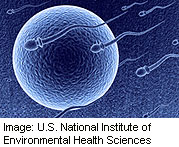

Collecting eggs from older women at an earlier stage for vitro fertilization could improve the chances of pregnancy, researchers report.
Previous studies have shown that IVF success declines from nearly 24 percent among women aged 38 to 39 to just over 1 percent among women aged 44 and older.
This new study found that the function of cells that support the development of eggs in the ovaries declines sharply after age 43. In older women, eggs in the ovaries are exposed to hormones normally released only after ovulation. This “false start” greatly reduces the likelihood of pregnancy, the researchers explained.
But, the researchers found that older women whose eggs were harvested earlier in the fertility treatment process — before being exposed to the after-ovulation hormones — produced more good quality embryos and had higher pregnancy rates than those whose eggs were collected at a later stage of maturity.
The study was published Aug. 12 in the Journal of Endocrinology.
“We used to think that aging eggs were responsible for poor IVF success rates in older women, but here we show that it is more due to the aging of the egg’s environment,” study author Dr. Yanguang Wu, an embyrologist and associate scientist at the Center for Reproductive Medicine in New York, said in a journal news release.
“The chances of reversing damage to an egg are practically zero, and so these findings are exciting because it’s much more hopeful to therapeutically target the egg’s supporting environment,” he explained.
Wu said larger studies are needed to confirm the findings. He added that he hopes this study will help produce new strategies for achieving pregnancy in older women.
More information
The U.S. National Library of Medicine has more about in vitro fertilization.
Source: HealthDay
Copyright © 2024 HealthDay. All rights reserved.

Leave a Reply